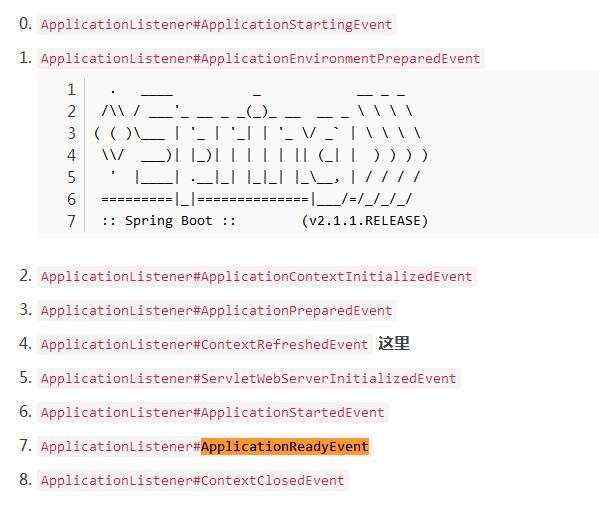篇首语:本文由编程笔记#小编为大家整理,主要介绍了Spring执行ApplicationEvent事件顺序ServletWebServerInitializedEvent相关的知识,希望对你有一定的参考价值。
测试代码:
package com.github.abel533.event;
import com.github.abel533.C;
import org.springframework.context.ApplicationEvent;
import org.springframework.context.ApplicationListener;
import org.springframework.stereotype.Component;
/**
* @author liuzh
*/
@Component
public class ApplicationListenerImpl implements ApplicationListener
public ApplicationListenerImpl() {
C.print("ApplicationListenerImpl#constructor");
}
@Override
public void onApplicationEvent(ApplicationEvent event) {
C.print("ApplicationListener#" + event.getClass().getSimpleName());
}
}
package com.github.abel533.event;
import com.github.abel533.lifecycle.BeanLifecycle;
import org.springframework.boot.SpringApplication;
import org.springframework.boot.autoconfigure.SpringBootApplication;
import org.springframework.context.annotation.Bean;
@SpringBootApplication
public class ListenerApplication {
public static void main(String[] args) {
SpringApplication.run(ListenerApplication.class, args).close();
}
}
用以上代码实现 ApplicationListener 接口,输出所有事件。
当以 @Component 方式配置时
事件触发顺序如下:
ApplicationListener#ContextRefreshedEvent
ApplicationListener#ServletWebServerInitializedEvent
ApplicationListener#ApplicationStartedEvent
ApplicationListener#ApplicationReadyEvent
ApplicationListener#ContextClosedEvent
当通过 /META-INF/spring.factories 配置时
配置内容如下:
org.springframework.context.ApplicatiOnListener=com.github.abel533.event.ApplicationListenerImpl
此时输出的事件顺序如下:

差异
很容易通过对比发现,Event 触发的时间极早,以至于 @Component 方式只能从第 4 个事件才开始获取到。
从这两种方式的加载时机来看这个差异产生的原因。
在 SpringApplication 构造方法中,就调用 getSpringFactoriesInstances 来获取 /META-INF/spring.factories 配置的 ApplicationListener,代码如下:
public SpringApplication(ResourceLoader resourceLoader, Class... primarySources) {
this.resourceLoader = resourceLoader;
Assert.notNull(primarySources, "PrimarySources must not be null");
this.primarySources = new LinkedHashSet<>(Arrays.asList(primarySources));
this.webApplicatiOnType= WebApplicationType.deduceFromClasspath();
setInitializers((Collection) getSpringFactoriesInstances(
ApplicationContextInitializer.class));
setListeners((Collection) getSpringFactoriesInstances(ApplicationListener.class));
this.mainApplicatiOnClass= deduceMainApplicationClass();
}
在 SpringFactoriesLoader#loadFactoryNames 实现了从该配置文件获取实现名的方法。从这之后就能收到后续触发的事件。
通过 @Component 方式时,在 SpringApplication#refresh 中调用 registerListeners 获取的所有 ApplicationListener 接口的实现。代码如下:
@Override
public void refresh() throws BeansException, IllegalStateException {
synchronized (this.startupShutdownMonitor) {
try {
// 注册所有 ApplicationListener 实现
registerListeners();
// Instantiate all remaining (non-lazy-init) singletons.
finishBeanFactoryInitialization(beanFactory);
// 这里会触发 ContextRefreshedEvent
finishRefresh();
}
}
}
下面先分析前 4 个无法获取的事件顺序。
ApplicationStartingEvent
第 0 个事件是在 EventPublishingRunListener#starting 中发布的,代码如下:
@Override
public void starting() {
this.initialMulticaster.multicastEvent(
new ApplicationStartingEvent(this.application, this.args));
}
此时的堆栈调用情况如下:
onApplicationEvent:15, ApplicationListenerImpl (com.github.abel533.event)
doInvokeListener:172, SimpleApplicationEventMulticaster (org.springframework.context.event)
invokeListener:165, SimpleApplicationEventMulticaster (org.springframework.context.event)
multicastEvent:139, SimpleApplicationEventMulticaster (org.springframework.context.event)
multicastEvent:127, SimpleApplicationEventMulticaster (org.springframework.context.event)
starting:69, EventPublishingRunListener (org.springframework.boot.context.event)
starting:48, SpringApplicationRunListeners (org.springframework.boot)
run:302, SpringApplication (org.springframework.boot)
run:1260, SpringApplication (org.springframework.boot)
run:1248, SpringApplication (org.springframework.boot)
main:12, ListenerApplication (com.github.abel533.event)
ApplicationEnvironmentPreparedEvent
第 1 个事件是在 EventPublishingRunListener#environmentPrepared 中发布的,代码如下:
@Override
public void environmentPrepared(ConfigurableEnvironment environment) {
this.initialMulticaster.multicastEvent(new ApplicationEnvironmentPreparedEvent(
this.application, this.args, environment));
}
此时的堆栈调用情况如下:
onApplicationEvent:15, ApplicationListenerImpl (com.github.abel533.event)
doInvokeListener:172, SimpleApplicationEventMulticaster (org.springframework.context.event)
invokeListener:165, SimpleApplicationEventMulticaster (org.springframework.context.event)
multicastEvent:139, SimpleApplicationEventMulticaster (org.springframework.context.event)
multicastEvent:127, SimpleApplicationEventMulticaster (org.springframework.context.event)
environmentPrepared:75, EventPublishingRunListener (org.springframework.boot.context.event)
environmentPrepared:54, SpringApplicationRunListeners (org.springframework.boot)
prepareEnvironment:347, SpringApplication (org.springframework.boot)
run:306, SpringApplication (org.springframework.boot)
run:1260, SpringApplication (org.springframework.boot)
run:1248, SpringApplication (org.springframework.boot)
main:12, ListenerApplication (com.github.abel533.event)
ApplicationContextInitializedEvent
第 2 个事件是在 EventPublishingRunListener#contextPrepared 中发布的,代码如下:
@Override
public void contextPrepared(ConfigurableApplicationContext context) {
this.initialMulticaster.multicastEvent(new ApplicationContextInitializedEvent(
this.application, this.args, context));
}
此时的堆栈调用情况如下:
onApplicationEvent:15, ApplicationListenerImpl (com.github.abel533.event)
doInvokeListener:172, SimpleApplicationEventMulticaster (org.springframework.context.event)
invokeListener:165, SimpleApplicationEventMulticaster (org.springframework.context.event)
multicastEvent:139, SimpleApplicationEventMulticaster (org.springframework.context.event)
multicastEvent:127, SimpleApplicationEventMulticaster (org.springframework.context.event)
contextPrepared:81, EventPublishingRunListener (org.springframework.boot.context.event)
contextPrepared:60, SpringApplicationRunListeners (org.springframework.boot)
prepareContext:374, SpringApplication (org.springframework.boot)
run:314, SpringApplication (org.springframework.boot)
run:1260, SpringApplication (org.springframework.boot)
run:1248, SpringApplication (org.springframework.boot)
main:12, ListenerApplication (com.github.abel533.event)
ApplicationPreparedEvent
第 3 个事件是在 EventPublishingRunListener#contextLoaded 中发布的,代码如下:
@Override
public void contextLoaded(ConfigurableApplicationContext context) {
for (ApplicationListener listener : this.application.getListeners()) {
if (listener instanceof ApplicationContextAware) {
((ApplicationContextAware) listener).setApplicationContext(context);
}
context.addApplicationListener(listener);
}
this.initialMulticaster.multicastEvent(
new ApplicationPreparedEvent(this.application, this.args, context));
}
此时的堆栈调用情况如下:
onApplicationEvent:15, ApplicationListenerImpl (com.github.abel533.event)
doInvokeListener:172, SimpleApplicationEventMulticaster (org.springframework.context.event)
invokeListener:165, SimpleApplicationEventMulticaster (org.springframework.context.event)
multicastEvent:139, SimpleApplicationEventMulticaster (org.springframework.context.event)
multicastEvent:127, SimpleApplicationEventMulticaster (org.springframework.context.event)
contextLoaded:93, EventPublishingRunListener (org.springframework.boot.context.event)
contextLoaded:66, SpringApplicationRunListeners (org.springframework.boot)
prepareContext:393, SpringApplication (org.springframework.boot)
run:314, SpringApplication (org.springframework.boot)
run:1260, SpringApplication (org.springframework.boot)
run:1248, SpringApplication (org.springframework.boot)
main:12, ListenerApplication (com.github.abel533.event)
ContextRefreshedEvent
在上面差异中提到 finishRefresh 会触发 ContextRefreshedEvent,代码如下:
@Override
protected void finishRefresh() {
super.finishRefresh();
WebServer webServer = startWebServer();
if (webServer != null) {
publishEvent(new ServletWebServerInitializedEvent(webServer, this));
}
}
注意 super.finishRefresh,代码如下(有删减):
protected void finishRefresh() {
// Publish the final event.
publishEvent(new ContextRefreshedEvent(this));
}
ServletWebServerInitializedEvent
注意前面 finishRefresh 方法,如果存在 webServer != null,就会发布 ServletWebServerInitializedEvent。
ApplicationStartedEvent
在 SpringApplication#run 方法中,执行完成后,就会调用 listeners.started(context); 方法,在这里面会发布 ApplicationStartedEvent。
ApplicationReadyEvent
和上面 ApplicationStartedEvent 一样,如下代码(有删减):
// ApplicationStartedEvent
listeners.started(context);
callRunners(context, applicationArguments);
// ApplicationReadyEvent
listeners.running(context);
执行完所有 ApplicationRunner 和 CommandLineRunner 接口方法后,就会调用 listeners.running(context),在这里面就会发布 ApplicationReadyEvent。
在这之后就没有运行期的主要事件了(不考虑 devtools 重启)。在这个事件里,可以请求zookeeper进行服务注册,以便其它服务发现并调用它等相关操作。
ContextClosedEvent
当调用关闭方法的时候,自然就触发了 ContextClosedEvent,调用堆栈如下:
onApplicationEvent:20, ApplicationListenerImpl (com.github.abel533.event)
doInvokeListener:172, SimpleApplicationEventMulticaster (org.springframework.context.event)
invokeListener:165, SimpleApplicationEventMulticaster (org.springframework.context.event)
multicastEvent:139, SimpleApplicationEventMulticaster (org.springframework.context.event)
publishEvent:398, AbstractApplicationContext (org.springframework.context.support)
publishEvent:355, AbstractApplicationContext (org.springframework.context.support)
doClose:994, AbstractApplicationContext (org.springframework.context.support)
close:961, AbstractApplicationContext (org.springframework.context.support)
main:12, ListenerApplication (com.github.abel533.event)
本文转自:https://blog.csdn.net/isea533/article/details/100146833

 京公网安备 11010802041100号 | 京ICP备19059560号-4 | PHP1.CN 第一PHP社区 版权所有
京公网安备 11010802041100号 | 京ICP备19059560号-4 | PHP1.CN 第一PHP社区 版权所有